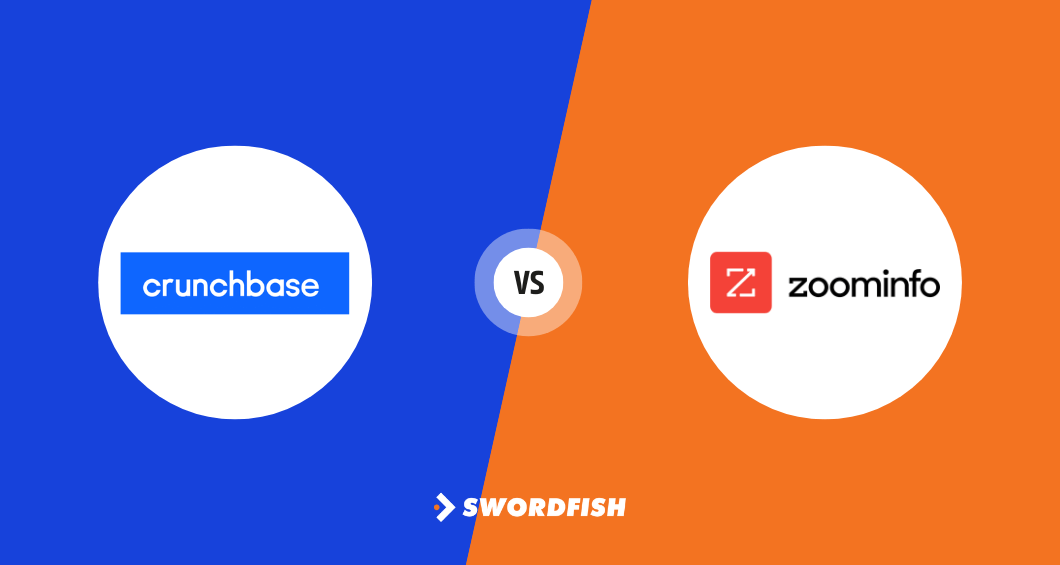
Have you been searching for the right tool to boost your market research and business intelligence? Look no further than Crunchbase and ZoomInfo, both standout choices for comprehensive data on companies, industry trends, and insights.
- Crunchbase: This platform is a hub of information on startups and investors, making it a top pick for new market players and venture capitalists. It’s your go-to source for the latest on emerging companies and the investment landscape.
- ZoomInfo: If you’re in sales or marketing, ZoomInfo is your ally. It excels in providing detailed B2B contact and company data, essential for generating sales leads and creating targeted marketing strategies.
But wait, there’s more to these platforms than meets the eye. Stay tuned to find out how each can uniquely benefit your business strategy and how you can consider an alternative in this sector as well!
Key Takeaways
- Data Coverage: ZoomInfo excels in B2B contact data, ideal for sales and marketing efforts. While Crunchbase focuses more on detailed company data. It’s useful for market research and investment insights.
- User Interface and Experience: ZoomInfo has a user-friendly interface for easy data access. On the flip side, Crunchbase is known for its clean layout and straightforward navigation. It’s beneficial for new users or for simple research tasks.
- Pricing Models: ZoomInfo pricing is typically higher, based on usage scale and features, making it a significant investment. In contrast, Crunchbase offers more accessible pricing tiers. It’s suitable for smaller businesses or individual needs.
- Swordfish as an Alternative: Swordfish is emerging as one of the strong Crunchbase and ZoomInfo alternatives, known for its ability to provide direct contact information quickly. It’s a good option for those needing specific contact details without the broader company data.
Crunchbase vs ZoomInfo: Key Comparison Table
There are differences between Crunchbase and ZoomInfo in many aspects. Let’s explore them in a comparison table:
|
Features |
Crunchbase |
ZoomInfo |
|
Primary Focus |
Startup and investor data | B2B contact and company data |
| Database | 80 million business profiles across 195 countries and 34 industries |
Over 260 million professional profiles and 13 million business profiles |
|
API Access |
REST API and daily CSV export | Available for integrating ZoomInfo data into CRM |
| Trial and Free Access | Access with up-to-date company names, locations, and domains available. |
Offers a free trial and a community edition |
|
Target Audience |
Market researchers, investors, and those tracking startups | Sales and marketing professionals |
| User Interface | Clean, intuitive layout and easy for beginners |
User-friendly |
Crunchbase vs ZoomInfo: In-depth Key Differences
Crunchbase and ZoomInfo stand out as prominent players. This in-depth comparison will focus on their key differences, in lead generation and management.
We’ll explore their B2B or B2C focus, data sources and quality, customizable filtering and segmentation, and integrations with CRM and API.
1. Lead Generation and Management
This section looks into how Crunchbase and ZoomInfo cater to different aspects of lead generation and management. It’s needed for businesses to make informed decisions.
B2B or B2C Focus
Crunchbase primarily serves B2B markets, focusing on startups, investors, and market trends. It’s ideal for businesses seeking investment and market insights. ZoomInfo, on the other hand, is B2B-oriented. It has detailed contact information and company profiles beneficial for marketing professionals.
Crunchbase:
Crunchbase is shaped by the B2B sector. It’s especially useful for startups and investors seeking market insights and opportunities.
ZoomInfo:
ZoomInfo excels in the B2B domain. It provides comprehensive contact and company data for sales and marketing initiatives.
Data Sources and Quality
Crunchbase sources its data from a mix of public and private channels. It ensures high accuracy in startup and investment information. ZoomInfo uses web scraping and public records to maintain a vast and updated B2B database.
Crunchbase:
Crunchbase’s data, sourced from reliable channels, is particularly accurate for startup and investment information.
ZoomInfo:
ZoomInfo’s extensive B2B database, which is regularly updated, ensures high-quality and relevant sales data.
Customizable Filtering and Segmentation
Crunchbase offers robust filtering options for segmenting data based on industry, funding, and geography. ZoomInfo has advanced filtering and segmentation tools. This helps sales and marketing professionals in targeting their ideal customer profiles.
Crunchbase:
Crunchbase allows detailed segmentation. This helps in targeted market research and investment tracking.
ZoomInfo:
ZoomInfo’s advanced filtering capabilities enable precise targeting for sales and marketing efforts.
Integrations with CRM and API
Crunchbase integrates well with various CRM systems. It enriches its utility for investment tracking and market research. ZoomInfo offers more extensive CRM and API integrations. It caters to a broader range of sales and marketing automation tools.
Crunchbase:
Crunchbase’s CRM integrations are beneficial for market research and tracking investments.
ZoomInfo:
ZoomInfo’s extensive CRM and API integrations are ideal for sales automation and marketing strategies.
Does Crunchbase Provide Better Lead Generation and Management Than ZoomInfo?
While both platforms have their strengths, your choice will depend on specific needs:
- Crunchbase: Choose if your focus is on market research, startup tracking, and investment insights.
- ZoomInfo: Opt for if your priority is sales lead generation, detailed B2B contact data, and marketing automation.
2. Data Validation and Real-time Updates
These days, the accuracy and timeliness of data are paramount. Let’s compare how Crunchbase and ZoomInfo perform in terms of lead scoring capabilities, website visitor identification, and real-time data updates.
Lead Scoring Capabilities
Crunchbase and ZoomInfo both offer lead-scoring capabilities, but they cater to different audiences. Its scoring is more aligned with market trends and investment potential. ZoomInfo, however, excels in scoring leads based on B2B sales potential. It utilizes its vast database to have detailed insights for marketing teams.
Crunchbase:
Crunchbase’s lead scoring is valuable for assessing investment and market trends. This basically helps businesses identify potential investment opportunities and market movements.
ZoomInfo:
ZoomInfo’s lead scoring excels in evaluating B2B sales potential. It gives businesses necessary insights for targeting and prioritizing sales leads effectively.
Website Visitor Identification
Crunchbase provides basic visitor identification features, mainly useful for tracking interest in startups and investment opportunities. ZoomInfo, on the flip side, has more advanced website visitor identification tools. This allows businesses to identify and target potential leads more effectively.
Crunchbase:
Crunchbase’s visitor identification is geared toward investment tracking. It offers insights into who is interested in specific startups or market sectors.
ZoomInfo:
ZoomInfo offers advanced visitor identification for effective B2B lead targeting. It helps sales and marketing teams understand and engage with their website visitors.
Real-Time Data
Crunchbase updates its data regularly, focusing on the latest trends in startups and investments. ZoomInfo stands out for its real-time data updates in the B2B sector. This provides current contact information and company profiles, which is essential for sales activities.
Crunchbase:
Crunchbase offers regular updates on startup and investment trends. It confirms that you always have access to the latest market data.
ZoomInfo:
ZoomInfo excels in providing real-time updates in the B2B sector. It has up-to-date contact information and company insights for immediate sales action.
Should You Choose Crunchbase or ZoomInfo for Data Validation and Real-Time Updates?
Choosing between Crunchbase and ZoomInfo for data validation and real-time updates depends on your requirements:
- Crunchbase: Ideal if you’re focusing on market research, startup tracking, and investment insights, with regular data updates.
- ZoomInfo: Best suited for those who need real-time B2B data updates and detailed sales lead information for immediate action.
3. Convenience and Support
When choosing between Crunchbase and ZoomInfo, it’s essential to consider aspects. Such as ease of use, customer support, and compliance with laws to ensure a smooth and reliable experience.
Ease of Use
Crunchbase offers a straightforward interface, beneficial for users focusing on startup and investment data. ZoomInfo, with its complete B2B focus, provides a more detailed interface. This caters to sales and marketing professionals who require in-depth data analysis.
Crunchbase:
Crunchbase’s interface is user-friendly, especially for startup and investment research. Its straightforward design makes it easy for users to navigate and find the necessary information quickly.
ZoomInfo:
ZoomInfo’s detailed interface caters to in-depth B2B data analysis. While it has a wealth of information, the platform is designed to be intuitive, even with its advanced features.
Customer Support
Crunchbase and ZoomInfo, while both committed to legal standards, have distinct focus areas. Crunchbase ensures compliance mainly in handling startup and investment data. In contrast, ZoomInfo concentrates on legally compliant methods for gathering and utilizing B2B contact information.
Crunchbase:
Crunchbase offers adequate support for its investment and startup-focused users. Its customer service is geared towards helping users utilize its database for market research.
ZoomInfo:
ZoomInfo has complete support for its complex B2B tools. Its customer service team is equipped to assist with detailed queries. This makes it a reliable choice for sales and marketing professionals.
Compliance with Laws
Both Crunchbase and ZoomInfo adhere to legal standards, but their focus areas differ. Crunchbase assures compliance primarily in the context of startup and investment data. ZoomInfo places a strong emphasis on legal compliance in the collection and use of B2B contact information.
Crunchbase:
Crunchbase maintains legal compliance in startup and investment data handling. It ensures that its data collection and usage adhere to relevant laws and regulations.
ZoomInfo:
ZoomInfo focuses on compliance in B2B contact information collection and usage. It takes measures to ensure that its data-gathering methods are in line with legal standards.
Which One Provides Better User Convenience And Support: Crunchbase or ZoomInfo?
Choosing between Crunchbase and ZoomInfo for user convenience and support will depend on what type of assistance you want:
- Crunchbase: Ideal if you’re looking for an easy-to-use platform with adequate support for startup and investment data.
- ZoomInfo: Best suited for those who need complete support for complex B2B sales and marketing tools.
4. Pricing and Scalability
In the comparison between Crunchbase and ZoomInfo, understanding their pricing structures, free trial options, and scalability is necessary. You can determine which platform aligns best with your business needs and growth plans.
Pricing and Plans
While Crunchbase offers more accessible pricing plans suitable for startups and smaller businesses, ZoomInfo helps larger enterprises. It has a pricing model that reflects its B2B data and advanced features.
Crunchbase:
Crunchbase’s pricing structure is designed to be budget-friendly and appealing to startups, small businesses, and individual investors. It offers various plans such as Monthly ($99), Annual ($49) and Customized which provide essential data on startups and investment trends.
ZoomInfo:
ZoomInfo’s pricing is structured for larger enterprises and sales-focused organizations. It reflects the platform’s extensive B2B database and advanced sales and marketing tools.
Free Trial
Both Crunchbase and ZoomInfo offer free trials but with different levels of access and features. This caters to their respective target audiences.
Crunchbase:
Crunchbase’s free trial provides limited access to its database, offering a taste of its capabilities in tracking startups and investment opportunities. This trial is beneficial for individuals or small businesses looking to explore the platform’s basic features without a financial commitment.
ZoomInfo:
ZoomInfo’s free trial allows potential customers to experience a snapshot of its extensive B2B database and lead generation tools. This trial is useful for larger organizations and sales teams to evaluate the platform’s depth and relevance.
Scalability
Scalability is a crucial aspect when choosing between Crunchbase and ZoomInfo, as it determines how well the platform can grow with your business.
Crunchbase:
Crunchbase is scalable for startups and small to medium-sized businesses. It offers data and tools that align with the growth and development stages of these companies.
ZoomInfo:
ZoomInfo offers scalability suited to larger organizations and sales teams. Its extensive database and advanced features can accommodate the growing needs of these businesses, especially in lead generation and market analysis.
Which One is Affordable and Flexible Between Crunchbase and ZoomInfo?
Deciding between Crunchbase and ZoomInfo for affordability and flexibility depends on your business requirements:
Crunchbase: Ideal for startups and small businesses seeking affordable access to startup and investment data.
ZoomInfo: Best suited for larger organizations requiring a scalable solution with comprehensive B2B data and advanced sales tools.
5. Limitations
Crunchbase
Crunchbase, while a valuable resource for business information, in the startup and investment sectors, has its own set of limitations:
- Focused Data Range: Crunchbase primarily focuses on startups, venture capital, and investment data. This specialization might limit its usefulness for businesses looking for broader market or industry data.
- Limited B2B Sales Data: Unlike ZoomInfo, Crunchbase is not as extensive in providing B2B sales leads and contact information. This can be a drawback for sales-driven organizations.
- Delayed Reporting: Some users have noted that Crunchbase can sometimes lag in updating the latest funding rounds or financial data. This might affect decision-making based on real-time data.
- Less Advanced Search Filters: Compared to ZoomInfo, Crunchbase’s search and filtering capabilities are less advanced. This can limit the precision of data segmentation.
ZoomInfo
ZoomInfo, known for its extensive B2B database and sales intelligence capabilities, also comes with certain limitations:
- Cost Factor: ZoomInfo’s pricing can be on the higher side, especially for small businesses or individual users. This makes it less accessible compared to other tools like Crunchbase.
- Data Overload: The sheer volume and detail of data available on ZoomInfo can be overwhelming for some users. Especially those who are new to such extensive B2B databases.
- Complexity in Navigation: Due to its complete features, the platform can be complex to navigate. It’s for users who are not as tech-savvy or familiar with advanced sales intelligence tools.
- Privacy Concerns: ZoomInfo’s method of data collection, through web scraping and email plugins, has raised privacy concerns among some users.
6. Reviews
Crunchbase Reviews
G2: 4 out of 5
“Crunchbase basically shares, exchanges, and extracts information and insights on innovative companies and the people behind them. I was involved with Crunchbase in many projects like ML, natural language processing, and analyzing trends, and patterns of acquisition of startups, etc”- Km R
ZoomInfo Reviews
G2: 5 out of 5
“We lean heavily on account-based marketing and this tool allows us to effectively identify the correct people in an organization. We have several different lines of business that benefit from our products. We have to have insights into our addressable market and the ZoomInfo team is always there to help us build lists based on our requirement.”- Todd Q
Crunchbase vs ZoomInfo on Reddit
After analyzing the discussions on Reddit, it’s clear that Crunchbase and ZoomInfo serve distinct purposes and work to different needs in business. Here are some differences between the two, based on user experiences and feedback:
Target Audience
Crunchbase is frequently mentioned as a valuable resource for startups and investors, for tracking investments and competitive analysis.
ZoomInfo, on the other hand, is lauded for its effectiveness in established companies. Especially for sales professionals seeking detailed B2B leads and contact information.
Data Accuracy and Reliability
Users on Reddit have raised concerns about the accuracy of Crunchbase’s data, in early-stage funding.
ZoomInfo is generally praised for its accurate contact information. However, some users note occasional inaccuracies in company data.
Pricing and Accessibility
Crunchbase is often viewed as a more accessible option for smaller businesses or individuals.
In contrast, ZoomInfo is considered expensive but is valued for the quality and depth of its data. This makes it a preferred choice for larger organizations that can afford the investment.
Functionality and Use Case
Crunchbase is seen as a tool for retrospective analysis. Plus, it’s useful for understanding market trends and investment patterns.
ZoomInfo is shown for its real-time lead generation capabilities. This provides actionable sales leads and detailed company insights.
User Experience
Some Reddit users prefer alternatives like PrivCo and PitchBook over Crunchbase for more financial reporting.
ZoomInfo users appreciate its lead generation capabilities but mention the complexity and overwhelming nature of its extensive database.
Crunchbase vs ZoomInfo: Which One Should You Choose?
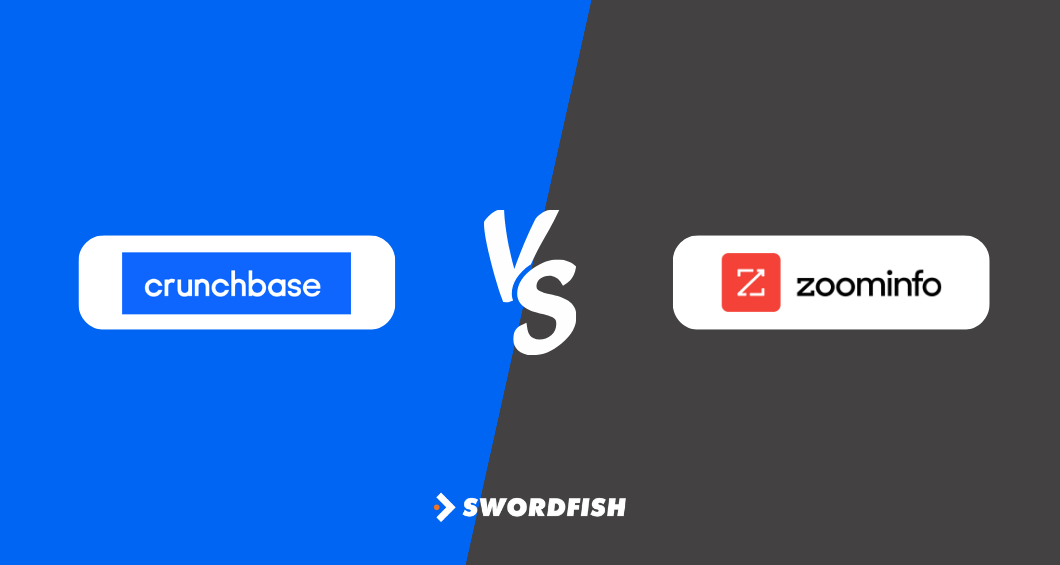
Deciding between Crunchbase and ZoomInfo can be challenging. Here are some points to consider, based on user reviews and research:
-
If You’re a Startup or Investor
From reviews, we found out that Crunchbase is more suited for startups and investors. It’s great for tracking investments and understanding market trends relevant to early-stage companies.
-
For Established Companies Focused on Sales
Research indicates that ZoomInfo is ideal if you’re in a well-established company and need detailed B2B sales leads. It’s useful for sales professionals looking for accurate contact information.
-
Budget Considerations
If budget is a concern, Crunchbase might be the better choice. User feedback suggests it’s more accessible and budget-friendly for smaller businesses or individual users. It’s compared to the higher cost of ZoomInfo.
-
Need for Accurate, Real-Time Leads
If your priority is getting real-time, actionable sales leads, ZoomInfo is recommended. Reviews show that it excels in providing up-to-date contact information and company insights, despite its higher price point.
-
Ease of Use and Data Reliability
If you prefer a platform that’s user-friendly and offers reliable data, especially for investment tracking, Crunchbase is a good choice.
However, if you need a tool with powerful lead generation capabilities and can navigate a more complex interface, ZoomInfo is the way to go.
Swordfish AI: The Best Alternative of Crunchbase and ZoomInfo
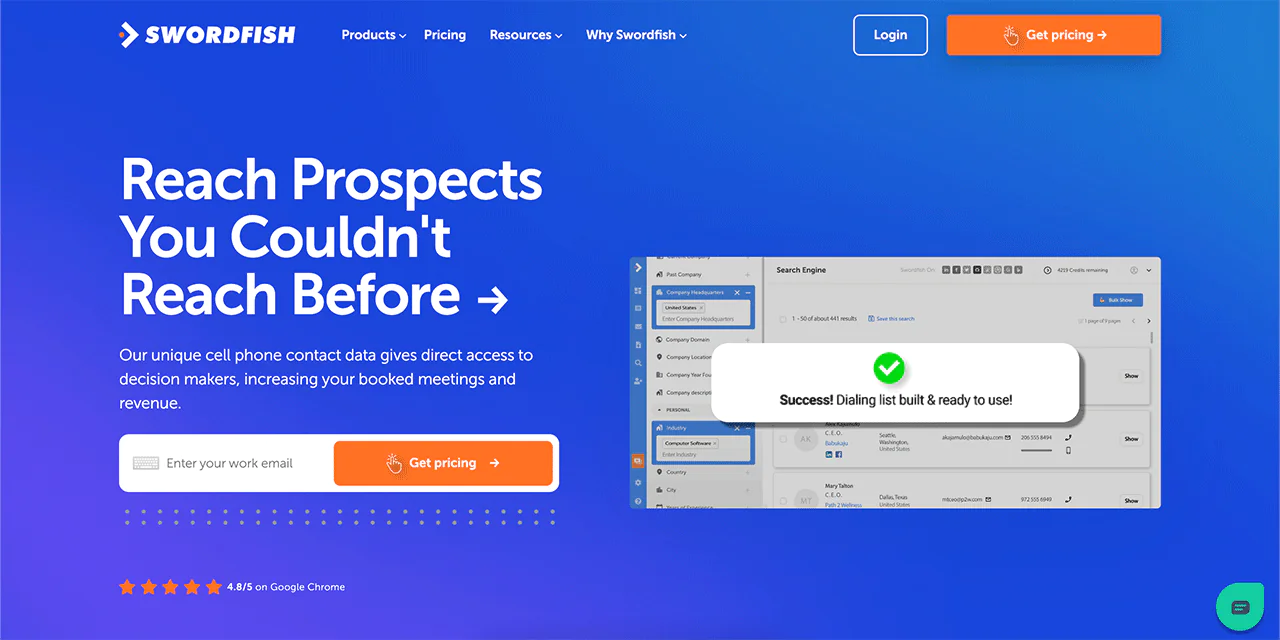
Swordfish AI is the best alternative to Crunchbase and ZoomInfo, useful for those who need to contact important people directly, like in sales and recruitment. It specializes in offering cell phone numbers that are hard to find elsewhere.
The platform claims about 40% of its contact information is accurate, and it often has 33% more useful cell phone numbers than other services. It checks phone numbers in real-time to make sure they work.
Swordfish AI has easy-to-use tools like a Chrome Extension, a Prospecting tool, and a feature for uploading files. These tools help users find more leads and improve their customer relationship management databases.
The platform also includes Bombora® Intent Data, which helps in finding businesses that are likely to be interested in a service or product, making it a good choice for finding leads and contacts.
Now let’s see the features of Swordfish AI:
Chrome Extension
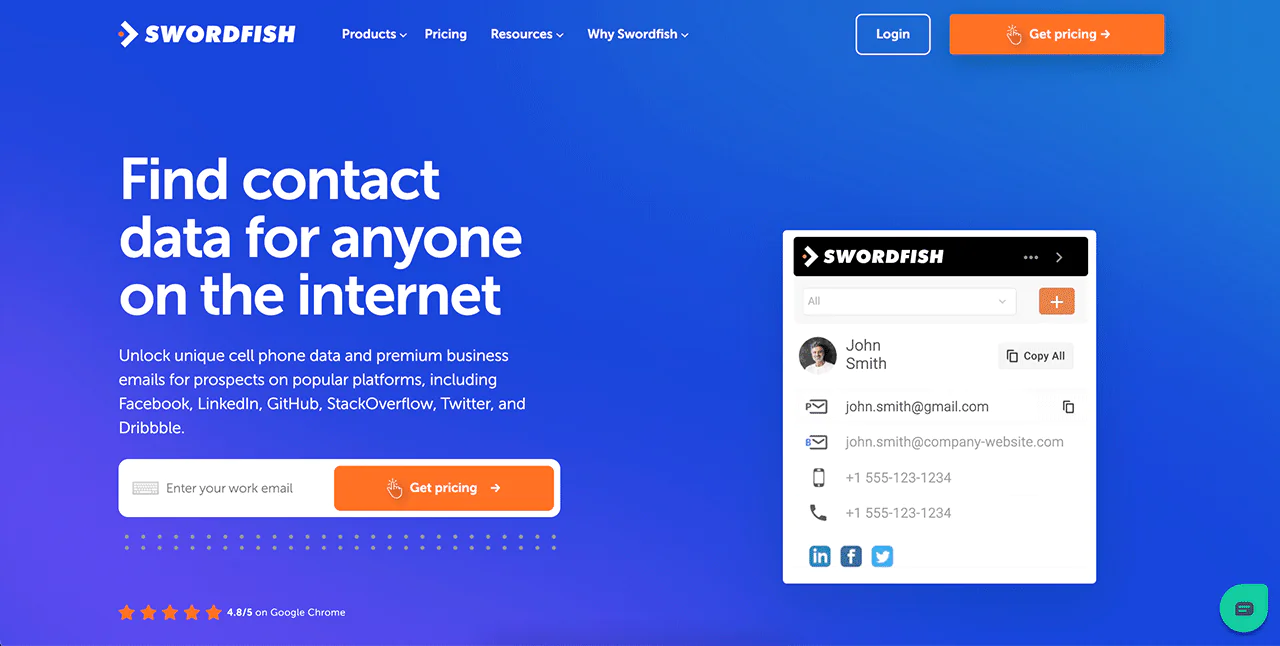
This feature allows users to find verified contact information across various online platforms. This expands the efficiency of lead generation and contact sourcing.
API Integration
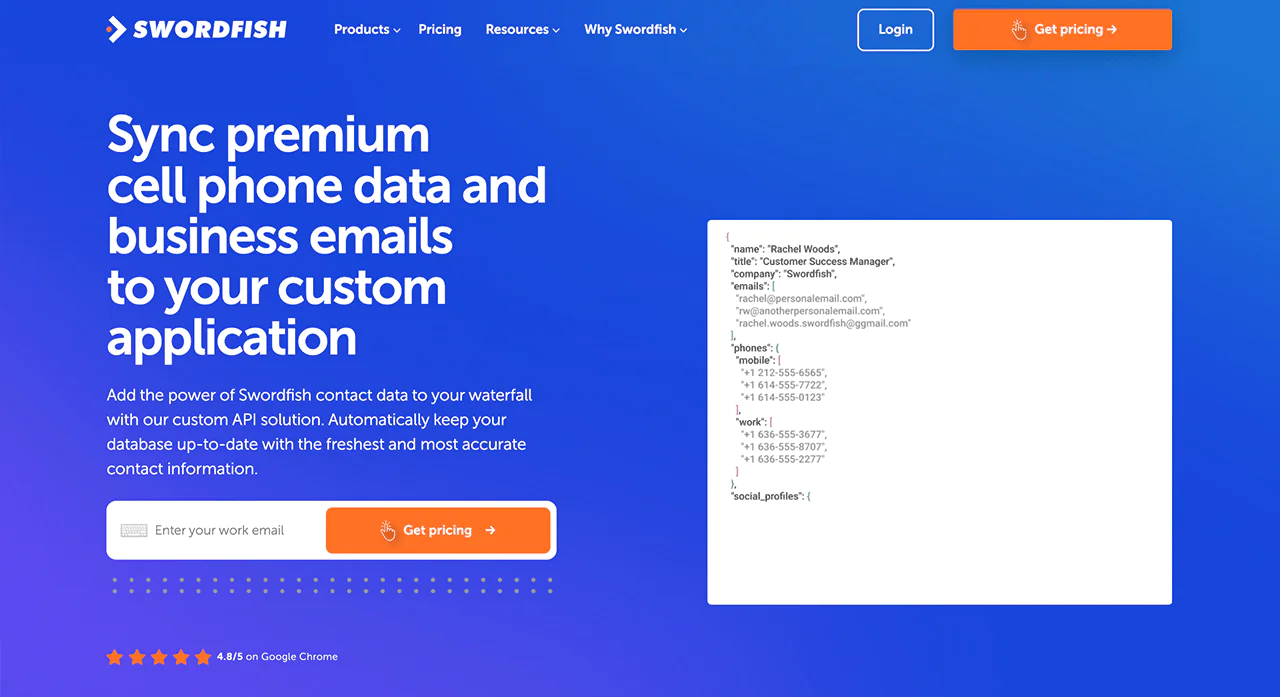
Swordfish AI’s API Integration empowers applications with its unique data capabilities. It’s ideal for you to incorporate accurate contact information into your existing systems or applications.
Prospector Tool
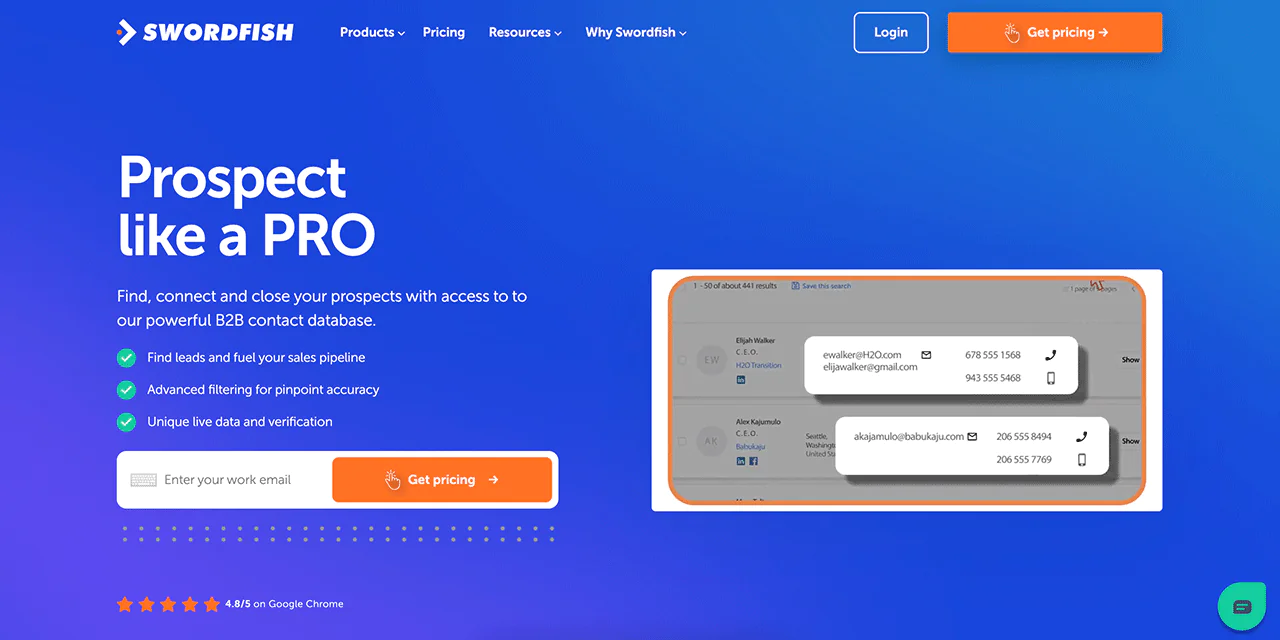
You can quickly create targeted dialing and email lists using advanced filters. This makes it a powerful tool for building accurate lead generation strategies.
File Upload Feature
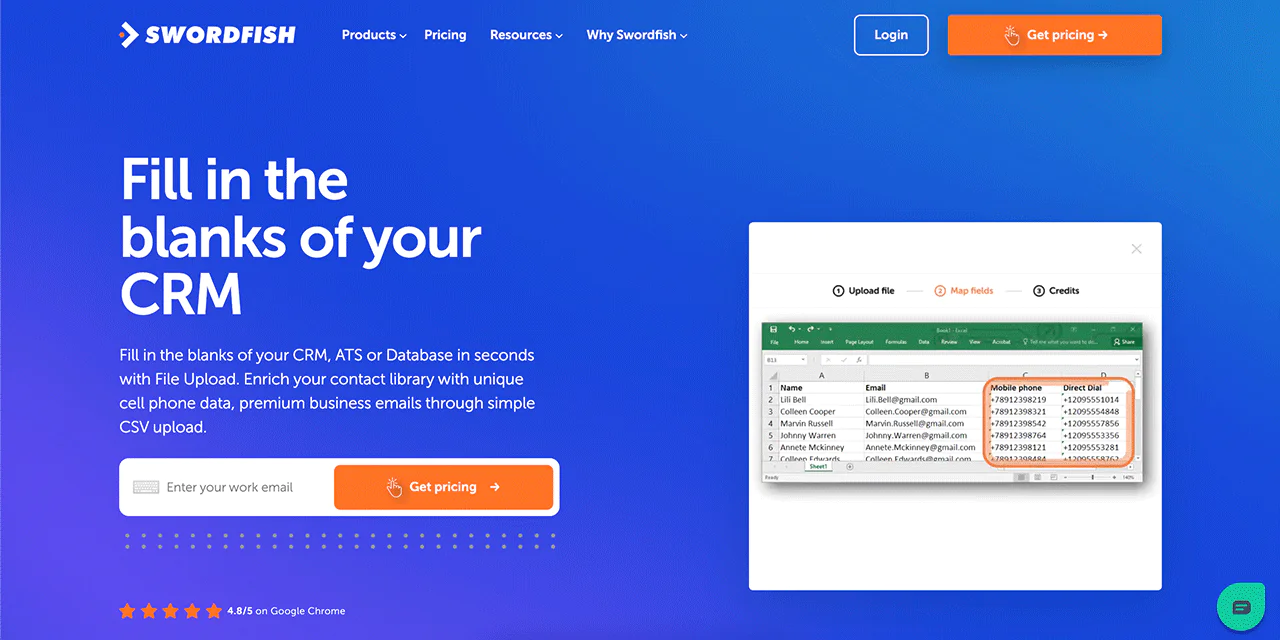
This functionality enables users to enrich their CRM databases by filling in missing cell phone numbers and emails. It optimizes contact management processes.
Reverse Search
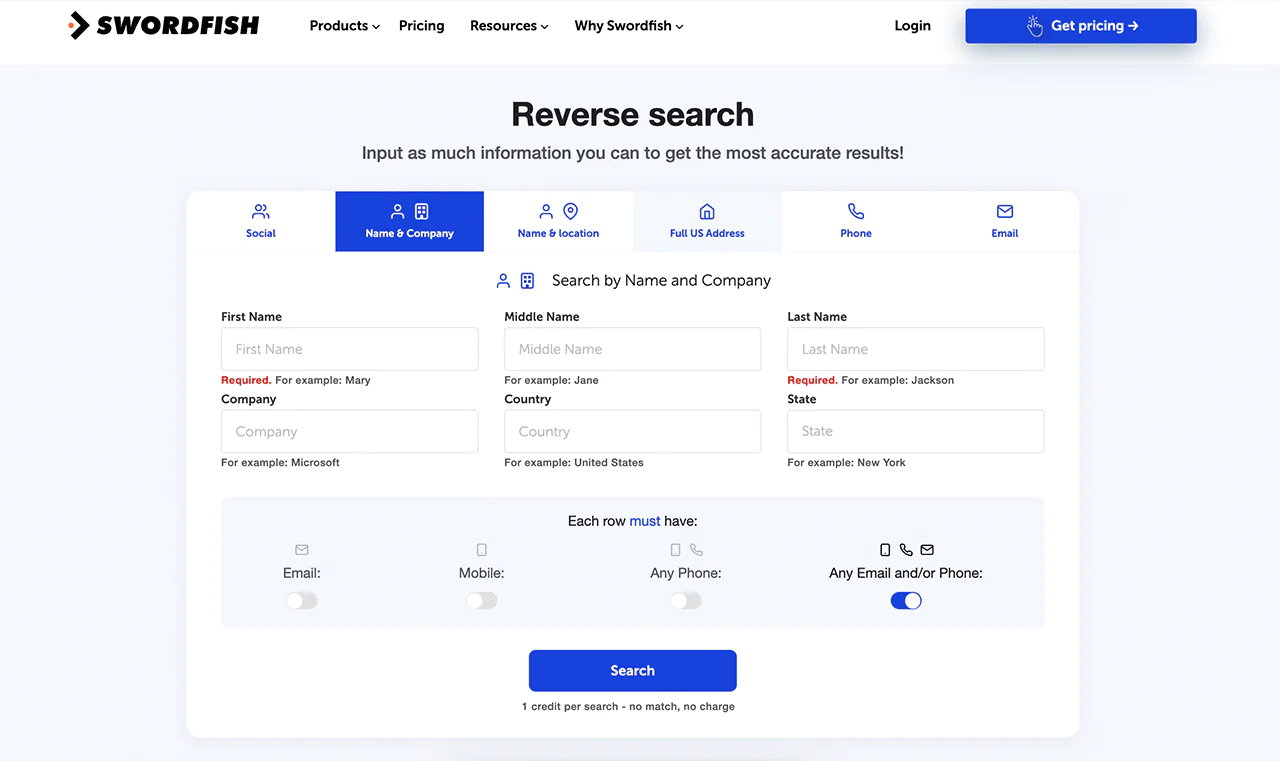
Swordfish AI’s Reverse Search feature allows users to find complete contact information using various data points. Whether you want any information, Swordfish AI can locate the person you’re looking for by this.
Bombora Intent Data
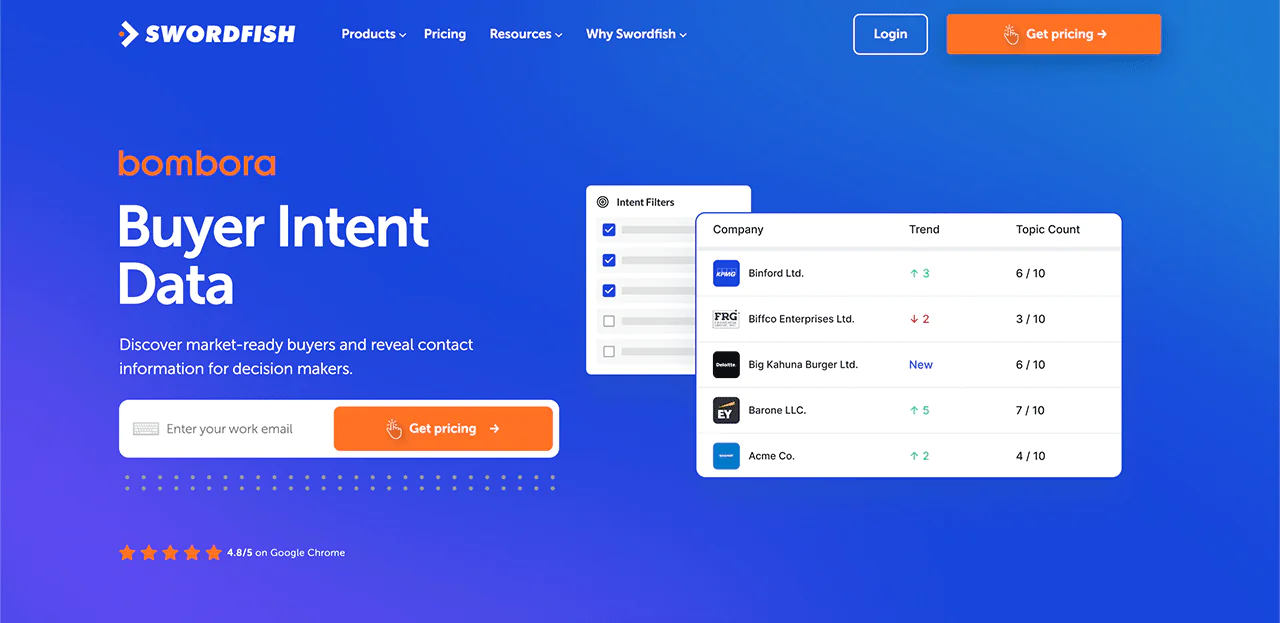
Bombora Intent Data in Swordfish AI reveals businesses poised to purchase your product. This feature identifies buyer intent, providing insights into market-ready buyers.
Pricing
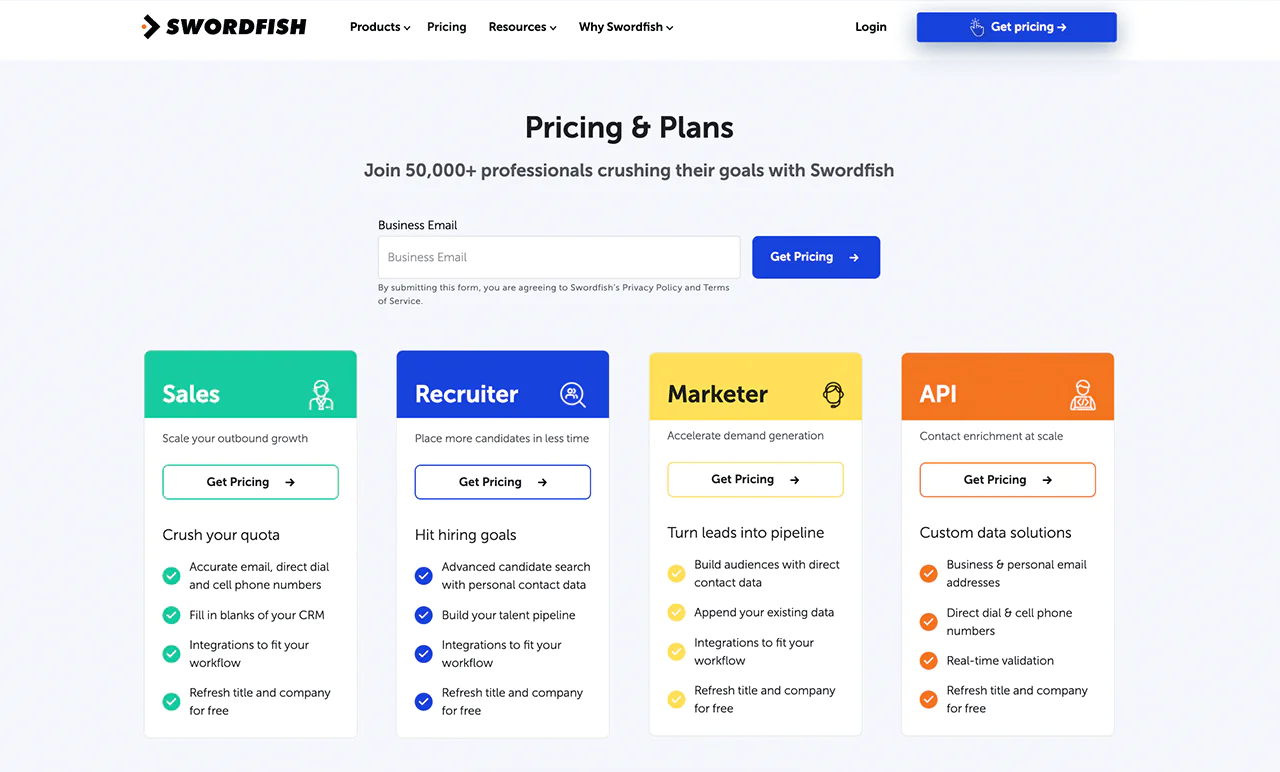
Comparison Table of Crunchbase vs ZoomInfo vs Swordfish AI
Now, let’s compare these 3 tools together:
|
Features |
Crunchbase | ZoomInfo |
Swordfish AI |
|
Database |
80 million business profiles across 195 countries and 34 industries | Over 260 million professional profiles | With over 3.5 billion contact data profiles |
| User Interface | Clean, intuitive layout, easy for beginners. | User-friendly |
Simplified interface for direct access |
|
Data Sources |
Latest industry trends and company data | Public records, business websites, annual reports, and web scraping | Unique cell phone data providers and real-time line connectivity validation |
| Target Audience | Market researchers, investors, tracking startups | Sales and marketing professionals |
Sales and recruitment professionals |
|
API Access |
REST API and daily CSV export | API for integrating data into CRM | Integrates unique data into applications. |
| Data Enrichment | Internal databases with accurate data. | CRM lead and contact data with B2B information |
Accurate contact information with real-time validation. |
Crunchbase vs ZoomInfo vs Swordfish: Which One Should You Pick?
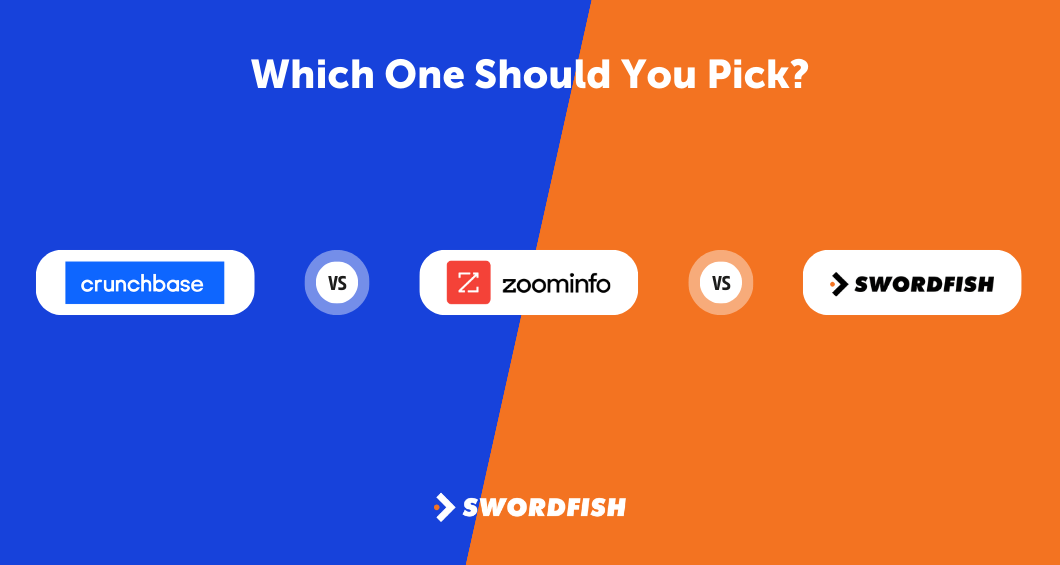
Crunchbase, ZoomInfo, and Swordfish AI each offer unique features and strengths. While there’s no one-size-fits-all winner, your choice depends on what you’re looking for in a tool.
Let’s break down which one you should pick based on your specific needs.
Crunchbase
If you’re an entrepreneur, startup, or investor, Crunchbase is your go-to resource. It’s particularly strong in providing detailed information about startups, funding rounds, and investors.
This platform is ideal if your focus is on market research and tracking investment trends in the startup ecosystem.
ZoomInfo
ZoomInfo shines for sales and marketing professionals in established businesses. If you need in-depth B2B contact data and company information to generate leads and drive sales strategies this is for you. The platform’s extensive database and advanced search capabilities make it a powerful choice.
Swordfish AI
Consider Swordfish AI if you’re looking for direct access to decision-makers. It’s a great tool for sales and recruitment professionals who need accurate cell phone numbers and email addresses. If you value real-time validation of contact data, Swordfish AI offers a unique edge.
Conclusion
In conclusion, the comparison between Crunchbase vs ZoomInfo reveals distinct strengths for each platform.
To sum up the whole discussion, if you’re involved in startup research or seeking investment opportunities, Crunchbase is your best bet.
However, for those in sales and marketing looking to generate leads and dive deep into B2B data, ZoomInfo stands out as the more suitable choice.
Try out Swordfish AI for direct access and accurate contact information. You can align with your specific business needs and the scenarios you face in your professional journey with this tool.
FAQs
Is Crunchbase better for startups than ZoomInfo?
Yes, Crunchbase is better for startups as it provides extensive data on funding, investors, and market trends. It’s actually relevant to new businesses and entrepreneurs.
Can ZoomInfo help in lead generation for sales?
Absolutely, ZoomInfo is excellent for lead generation in sales. This tool has a vast database of B2B contacts and company information to target potential customers.
Does Crunchbase offer contact information like ZoomInfo?
Crunchbase provides some contact information, but its strength lies in startup data and investment trends. It’s because this platform is not as extensive in contact details as ZoomInfo.


 View Products
View Products



